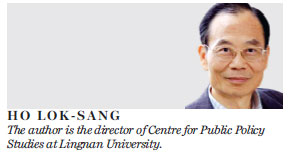Housing policy urgently needs to be revamped
Updated: 2015-03-03 06:37
By Ho Lok-Sang(HK Edition)
|
|||||||
The government is correct in saying Hong Kong's housing problems will ultimately have to be tackled by increasing supply. But it would be wrong to think there is not much they can do beyond demand management policies via various special stamp duties and mortgage loan ratio controls.
Indeed, the Special Stamp Duty and the Double Stamp Duty have worsened the situation. The latest round of mortgage loan tightening is yet another misguided policy which will not help Hong Kong's frustrated buyers. It could exacerbate the current difficult situation.
I have criticized the Special Stamp Duty since its inception. Its main effect has been to dramatically reduce housing market transactions. This is largely a result of homeowners preferring to stay put rather than buying better homes. Selling their homes would have allowed them to live in more spacious flats and release their homes to entry-level buyers. The Special Stamp Duty has reduced the supply of entry level homes, causing a direct rise in prices. This is making buying a home more difficult for first-time buyers. Yet no legislator has voiced objections to the policy on these grounds.
The Double Stamp Duty has aggravated the situation because homeowners wanting to sell their homes normally confirm purchases of their new homes before selling their current ones. Because this will make them liable to Double Stamp Duty, they may refrain from selling - unless there can be an exemption. The SAR government last year allowed homeowners who sold their homes more time, while still exempting them from the Double Stamp Duty. This unfortunately fueled expectations that home prices would rise and led to a further overheating of the market. Given that the vacated homes will increase supply, many analysts expect entry-level home pricing to soften in the medium term.
I have always maintained that the Hong Kong Monetary Authority's role is to ensure systematic risks do not damage the banking system. These can arise when large numbers of homes fall into negative equity and banks are left with loans which borrowers are unable to service. But I doubt anyone seriously believes our housing prices are likely to decline more than 30 percent this time. Although housing prices in Hong Kong did fall well in excess of 60 percent in the aftermath of the Asian financial crisis, my own econometric analysis based research showed this decline was due more to expectations of a large class of potential homebuyers who felt they could become homeowners with nominal payments of as little as HK$70,000 to HK$350,000 through the public housing privatization program.
When these buyers withdrew from the market, homeowners who had depended on them selling at low prices could no longer afford the prices they would otherwise have been prepared to pay for better homes. A "cascade effect" followed leading to a major collapse in home prices.
If there is sincerity in attempting to bring about a gradual reduction in home prices, the SAR government should offer a commitment to allow first-time homebuyers who are Hong Kong permanent citizens an opportunity to buy at, say, 10 times the median household annual income for a modest home, provided they agree not to simultaneously own any property directly in their own names or indirectly through company shareholdings. They should be committed to re-sell only to first-time buyers and while living in these flats as owner-occupiers. All these provisions would screen out investors. The announcement of the policy would immediately call into question the wisdom of paying high prices for tiny homes. Home sellers would then have to lower asking prices in order to achieve sales.
A key reason why housing prices appear to be uncontrollable is a reduction in the supply of second-hand entry-level homes resulting from the special stamp duties. The resumption of the sale of Home Ownership Scheme (HOS) housing attracted many more buyers than the available number of units. HOS housing prices are currently tied to the market prices of private flats. The fear that home prices rise faster than incomes encourages many to buy at inflated prices. My proposal of pegging the new HOS prices to median household incomes would be an important change which could transform the psychology of the housing market.
The government will continue to face difficulties in finding the land to produce new HOS housing units. But once it finds genuine buyers who have paid deposits to buy within the next five or so years, it will be in a far stronger position to build public support. Therefore, resistance to land requisition for the purpose of building new HOS housing would be reduced.

(HK Edition 03/03/2015 page10)